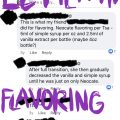(this post is a work in progress, as is much of this site! I’ll continue to add more!)

*Disclaimer of all Disclaimers! Research and discuss with your medical providers! This is not the end all be all of what anyone should do! This is not medical advice! I am NOT a Medical Professional! I am sharing information! (if you have something to share/add to this, please contact me).
(I am acknowledging Sarah as a main contributor! Here is her blog. Although it’s not updated, it’s the link she provided.)
Deep breath.
It seems to me, from the twelve years that I’ve been ‘here’ (infantreflux.org), that reflux seems to run in families/siblings most often when it’s a matter of protein intolerance and protein allergy issues (mspi, mfpi, fpies, etc).
There are some mothers who swear they prevented GERD in subsequent babies…I do not speak from experience! In my case, my baby’s GERD was a direct result of an immature lower esophageal sphincter (LES). The lower esophageal sphincter (LES) is a bundle of muscles at the bottom of the esophagus, where it meets the stomach. When the LES is closed, it prevents acid and stomach contents from ‘traveling.’ With an immature LES, it opens and closes on it’s own whim! How do I know this? My son’s reflux was not related to eating. Also, I was breastfeeding and I did the Dr. Sears Total Elimination Diet (TED), out of sheer desperation, even though my ‘gut’ told me his reflux was not related to my diet. I learned, through monitoring my diet, that his reflux was not related to what I was eating. Read Breastfeeding and Reflux for more info about this. I thank my lucky stars that my second did not have reflux!
The mother (Erinntx), who wrote all about how she did/managed/followed the TED, also successfully figured out how to have a baby without reflux! More about what she has to say later (go to the bottom of the page if you cannot wait!). Much of this has to do with breastfeeding; it is not my intention to alienate or shame anyone who formula feeds or to shame mothers into breast feeding! I am reporting what I have learned/gathered/gleaned; most anecdotal tales have been from breastfeeding mothers…That being said, it makes sense to me, that if you were to start off straight away with an elemental formula at birth, it’d be the same as (or as close as you can get) to altering your diet at the end of pregnancy, to make your milk free of potential offending proteins…
Erin’s story is at the end (Erinntx), when I get to babies. Pregnancy will be addressed first:
MOTHER’S BIOME
It’s important to realize your, the mother’s, biome is very important in all of this!
THE MICROBIOME’S MURKY ROLE IN PREGNANCY LOSS AND COMPLICATION
MOTHERS FACING C-SECTIONS LOOK TO VAGINAL ‘SEEDING’ TO BOOST THEIR BABIES’ HEALTH
MICROBIRTH: WHY ‘SEEDING BABY’S MICROBIOME’ NEEDS TO BE ON EVERY BIRTH PLAN
NATURAL BIRTH & BREASTFEEDING: REPLACEABLE?
- Click here for more about Vaginal ‘Seeding’ [link not active yet; that post is in progress]
MATERNAL MICROBIOTA AND ANTIBODIES AS ADVOCATES OF NEONATAL HEALTH
How a mother’s microbiome influences her baby before its born. Even before birth, a baby’s immune system is shaped by signals from the mother’s intestinal bacteria. These help the development of the baby’s immune cells and alter its gene expression profiles in preparation for its own postnatal bacterial colonisation. This paper adds new evidence about how signals originating from the mother’s intestinal microbiota are transferred to the offspring.
Two very important articles to read:
- NURTURING A BABY’S MICROBIOME, BEFORE AND AFTER BIRTH
- PREPARING THE BIRTH CANAL FOR THE PROBIOTIC GULP
When pregnant take probiotics! When baby is first born: give probiotics!
Why PROBIOTICS?
- Prevent GBS: One reason to take probiotics while pregnant is to try to prevent GBS, so that you can prevent antibiotics in labor. Here’s an article: Feasibility of Oral Prenatal Probiotics against Maternal Group B Streptococcus Vaginal and Rectal Colonization. Why do you want to avoid antibiotics in labor? Antibiotics kill off bacteria; they cannot, and do not, account for what may be GOOD bacteria. Basically, you want (and need!) healthy flora and fauna in your digestive system. Preventing GBS, along with a general push for ‘keeping your gut healthy,’ may help insure that your baby is born with a healthy gut and, following this line of thinking: the hope is that your baby will be less likely to have issues digesting and absorbing proteins, such as milk and soy (MSPI), and therefore less likely to have reflux as a result of it.
- Prevent Allergies: Article: Prevention of Allergy in Infants of Allergic Mothers by Probiotic Escherichia Coli; Article: Gut bacteria that Protect against Food Allergies Identified (it’s Clostridia & you can’t get that one just yet, but who’s to say others don’t help?) Thank you Jamie V. for adding: Currently there are two probiotics available that have the clostridium butyricum probiotic from that study: AOR-3 and Miyarisan.
- Prevent Colic: Encouraging microbiome diversity might help reduce colic [and you should know by now what I think about colic…Colic Vs Reflux] and allergies. Article: The probiotic Bifidobacterium breve B632 has been shown to inhibit the growth of Enterobacteriaceae within colicky infant microbiota cultures
- Prevent Eczema: “In conclusion, we could state that the prevention of infantile eczema represents a potential indication for probiotic use during pregnancy and early infancy.” Article: Probiotics for Prevention of Atopic Diseases in Infants: Systematic Review and Meta-analysis.
- Reduce Risk of Neuropsychiatric Disorder Development Later in Childhood: CONCLUSION: Probiotic supplementation early in life may reduce the risk of neuropsychiatric disorder development later in childhood possible by mechanisms not limited to gut microbiota composition.Pediatric Research (2015); doi:10.1038/pr.2015.51.
*Suggested PROBIOTICS for Pregnant & Breastfeeding Women to take: [comments from Sarah, mentioned at the top]
Floragen3 (is said to) prevent GBS. Take this daily.
Prescript-Assist this is expensive, so perhaps take this just twice a week…I use it because studies have shown farm bacteria exposure during pregnancy gives benefits to offspring (less immune issues) and Prescript Assist is a true soils probiotic (not one that claims to be but is actually lactobacillus). Also take while breastfeeding.
Jarrow Formulas Sacharomyces Boulardii & MOS (spread this out, too, as it is said to move in the gut three days. Plus, the pills are large and some pregnant women tend to get pill impaction when pregnant.) Also take while breastfeeding.
Femdophilus Probiotics By Jarrow Also take while breastfeeding.
Digestive Advantage Probiotics (contains GanedenBC30)
AOR-3 (clostridium butyricum from the study discussed above. Good for pregnant and breastfeeding mothers who are not concerned about dairy)
Miyarisan (clostridium butyricum from the study discussed above. Good for pregnant and breastfeeding mothers who are not concerned about dairy)
*Suggested PROBIOTICS for BABY (for baby, make sure it has bifodobacter):
Klaire Labs Ther-Biotic Infant Formula
GUTPRO Infant Powder
Solaray Babylife w/ Infido Infantis
More to Consider:
- 23andMe DNA Test Kit for Ancestry & Ethnic Composition This is extremely “buzzed about;” search any parenting group and this will surely appear at the forefront! I don’t know much detail, I am learning more each day; I DO know that there are gene mutations that point to many relevant (possible) scenarios, when having a baby. The main one being MTHFR which is? may be? linked to tongue/lip ties and MORE, perhaps even reflux or, reflux stemming from protein issues… (A .99¢ article explains the basics of MTHFR and helps support MTHFR. net). There are several web sites to get interpretation: Genetic Genie (you make a donation), Livewello (approximately $20 at this time), MTHFR. net. (You can also try and intrepret results on you own using Amy Yasko’s free ebook.
- I’ve made a separate MTHFR page, so click on through to learn more!
- Blood/Lab Tests (all from ‘regular’ lab & can be ordered from doctor): Mag RBC, Vitamin D 25 hydroxy, D 1-25 hydroxy, (see above) MTHFR (this only needs done once in your life, as it’s a gene), Homocystine & Full thyroid panel (TSH, T3, T4, rT3). Learn more from the Magnesium Advocacy Group. I believe your doctor can also order a Ferritin blood test. Ferritin is a protein found inside cells that stores iron so your body can use it later. A ferritin test indirectly measures the amount of iron in your blood. You want it to be above 50. From Morley Robbins: it’s important to round out your Iron panel with OTHER factors to reveal what’s going on: here’s a ‘combo’ test he recommends (below, too).
o Mag RBC
o plasma Zinc
o serum Copper…
o serum Ceruloplasmin, the KEY enzyme that REGULATES ALL Iron Proteins… (not likely that your doctor knows that… )
o serum Iron
o serum Transferrin
o serum TIBC (% Sat)
o serum Ferritin
- Diet: consider being gluten free and milk protein free during pregnancy…Gluten is (thought of as) an inflammatory. Some believe that inflammation is something to to watch, as it’s found in the bodies of people with autoimmune disorders…Try to eat organic or whole foods.
- Allergy: Testing and immunotherapy for allergies, immunotherapy can be continued during pregnancy safely. Look into Sublingual Immunotherapy (SLIT). Local honey or local bee pollen will also have allergens and the oral exposure can help to desensitize.
- HDC Helminths (this seems a little ‘out there’ but you decide! Think of it as a probiotic…)
- Vitamin D: Research this, of course! Ideally for pregnancy: above 50ng/ml. You need 5000 to 6000iu daily while pregnant (a conventional OB will not/may not know this). Take 5,000iu – daily, for a month, and then get it tested. In a few cases that will not be enough; some people need more for reasons such as obesity and gut malabsorption. The hope is also that your Vitamin D level will be high enough at birth, so that when breastfeeding you won’t have to give baby a supplement. Article: Sun exposure inversely related to food sensitization during infancy. So more sun exposure, less allergies…Food for thought…Research Vitamin D, because to me, it seems like it would go along with these findings?
- Zinc: “As a far as zinc, I believe 30-50 mg is the usual adult dose and zinc picolinate is the most widely used form. I’ve always had trouble with zinc- nausea and vomiting. So I’ve been trying to get my zinc up for many years. Only in the last year or so I began tolerating zinc Glycinate and I started with only 2.5mg. Slowly worked up to 10mg over time. I switched to zinc L-monomethionine a couple months ago and I’m at 15mg of that currently. They are 30mg capsules so I take half a cap daily. But after reading this Mutation in Zinc Transport Protein May Inhibit Successful Breastfeeding I’m thinking about increasing, esp since I’m 30wks now.” (From Laurie, a mother in Sarah (above’s) FB group: “you can use what I wrote and credit just some mother… Just some mother who has spent the last 7yrs researching, studying and learning biomed to recover her kid from his health issues.”
- Folinic Acid: Look for a prenatal (or just a regular multi) that has methylfolate or folinic acid, not folic acid. Vitamins with methylfolate instead of folic acid are seen as higher quality vitamin, as folic acid is (always? I don’t know) synthetic. Many believe it is a good sign when a company is recognizes the importance of the forms of folate.
- Magnesium: (see Blood/Lab Tests, above) “Moms should be taking at least 600-800 mg of magnesium daily while pregnant and breastfeeding.” “So many “pregnancy symptoms” are magnesium deficiency. Nausea, reflux, leg cramps, gestational diabetes, high BP, preeclampsia, nightmares, constipation, preterm labor.” See infantreflux Magnesium Page.
- Calcium: Do not take calcium and magnesium together. They compete with each other for absorption. Vitamin K2 will help you absorb calcium and keep it out of your arteries and into your bones. More K2 info, below.
- Ferritin: (see above, Blood/Lab Tests) “Needs to be above 50.”
- K2 (see below)
*Suggested PRENATALS/Supplements for Pregnant Women to take:
Folinic Acid: Look for a prenatal (or just a regular multi) that has methylfolate or folinic acid, not folic acid (listed below). Vitamins with methylfolate instead of folic acid are seen as higher quality vitamin, as folic acid is (always? I don’t know) synthetic. Many believe it is a good sign when a company is recognizes the importance of the forms of folate.
Vitamin D – get yours checked!
Zinc: some suggestions (from Laurie, mentioned above): Designs for Health brand Zinc Glycinate (“It was the first one that didn’t make me nauseous”). The zinc l monomethionine I have is NOW brand. Zinc picolinate seems to be good for many people, though: Thorne, Pure Encapsulations, Kirkman; these are all good, clean brands.
K2: Take at least 100mcg a day. You can take more. It is very beneficial. I use the Thorne K2 drops since my whole family uses them. If you take K2 during pregnancy or eat high K2 foods you will not get dental problems! And much less gum bleeding. You can take any brand though i think NOW K2 100mcg is the cheapest. Thorne also makes a K2/D3 drops combo, one drop is i believe 1000iu.” (Sarah)
Daily ‘Multis‘:
Nu-Thera Supplement (has good B Complex & Folinic Acid)
Nordic Naturals Ultimate Omega Liquid
Many take methylfolate in a prenatal vitamin, which may not have much in it (check!), so then they might also take 2400 mcg (micrograms) of folinic acid, for example:
Kirkman folinic acid in 800mcg caps 3x/day.
Seeking Health L-5-MTHF 1,00 mcg
Prenatal: (some pregnant woman report that in starting in any week in the ’20s weeks period’ of pregnancy, they started to feel bad on their prenatal. Advice: ‘switch it up/try another.”)
Klaire Prenatal with “Folate (as Metafolin L-5-methyltetrahydrofolate) 800mcg / 100%”
Thorne Prenatal ( I also got sick on the Thorne vitamins. For me it was due to the iron component so I switched over to Seeking health and didn’t look back. There are several you have to take, but I did a few at each meal. They do a good job adding choline and red raspberry leaf.”)
Seeking Health Prenatal (try splitting the dosing by taking it throughout the day) (“I couldn’t handle seeking health. I like the smarty pants gummies so far. Right now I’m struggling with gagging on any pills I have to swallow and then feeling nauseous.)”
Smarty Pants All in One PreNatal Gummy Vitamins
Designs For Health Prenatal Pro
Example of One Mother’s Regime:
Thorne Research OTC Basic Prenatal (3 a day)
Pure Encapsulations – B Complex Plus (1 a day)
Kirkman Buffered Magnesium Glycinate (2 a day)
Country Life Vitamin D3 2500 IU (2 a day)
Nordic Naturals – PreNatal DHA with Vitamin D (2 a day)
Kirkman Folinic Acid 800 mcg Capsules (3 a day)
From a mother [not infantreflux] who followed this protocol and has a healthy baby:
“In response to someone asking if a supplement they were taking that has 400 mcg of methylfolate per capsule is ok, I’m saying no, that dose is not enough. 800 mcg is the standard amount in most supps, which is a low dose. 2000 mcg or 2mg is better. I do believe there are many of us who need much higher, though. And, in pregnancy, it’s most important to make sure you’re getting what you need. I always suggest 3-5 mg for moms who are more at risk. I was getting a total of approx 9 mg when I was preg with my 6 mo. I’m compound hetero MTHFR.”
Example of One Mother’s Probiotic Regime:
A sample of what one pregnant mother is taking is this list below; she does not take all at once but aims for three a day of the following:
Mutaflor
Clostridium butyricum (Miyarisan and AOR-3 )
Culturelle Health and Wellness
Femdophilus Probiotics By Jarrow
Align Probiotic Supplement
Digestive Advantage Probiotics
Seeking Health ProBiota Bifido (has a prebiotic also, if you have SIBO, use as a suppository/enema only)
Prescript-Assist
InnovixLabs multi-strain probiotic
March 2015
More Related Reading:
Supplement Protocol for Babies Eating Solids
Formula Fed Babies: Ideas to Enrich Infant Health (this is also something to look at for babies before solids, breastfed too)
Magnesium for the Littles (has bath recipes for adults as well)
Related Viewing: Dr. Berger’s YouTube Channel
Preventing Autism and ADD by Dr. Debbie Hamilton
*Disclaimer of all Disclaimers! Research and discuss with your medical providers! This is not the end all be all of what anyone should do! This is not medical advice! I am NOT a Medical Professional! I am providing information!
Please do not solely rely on the information presented; always read labels, warnings, and directions before using or consuming a product. For additional information about a product, please contact the manufacturer. Content on this site is for reference purposes and is not intended to substitute for advice given by a physician, pharmacist, or other licensed health-care professional. You should not use this information as self-diagnosis or for treating a health problem or disease. Contact your health-care provider immediately if you suspect that you have a medical problem. Information and statements regarding dietary supplements have not been evaluated by the Food and Drug Administration and are not intended to diagnose, treat, cure, or prevent any disease or health condition. infantreflux.org assumes no liability for inaccuracies or misstatements about products.


